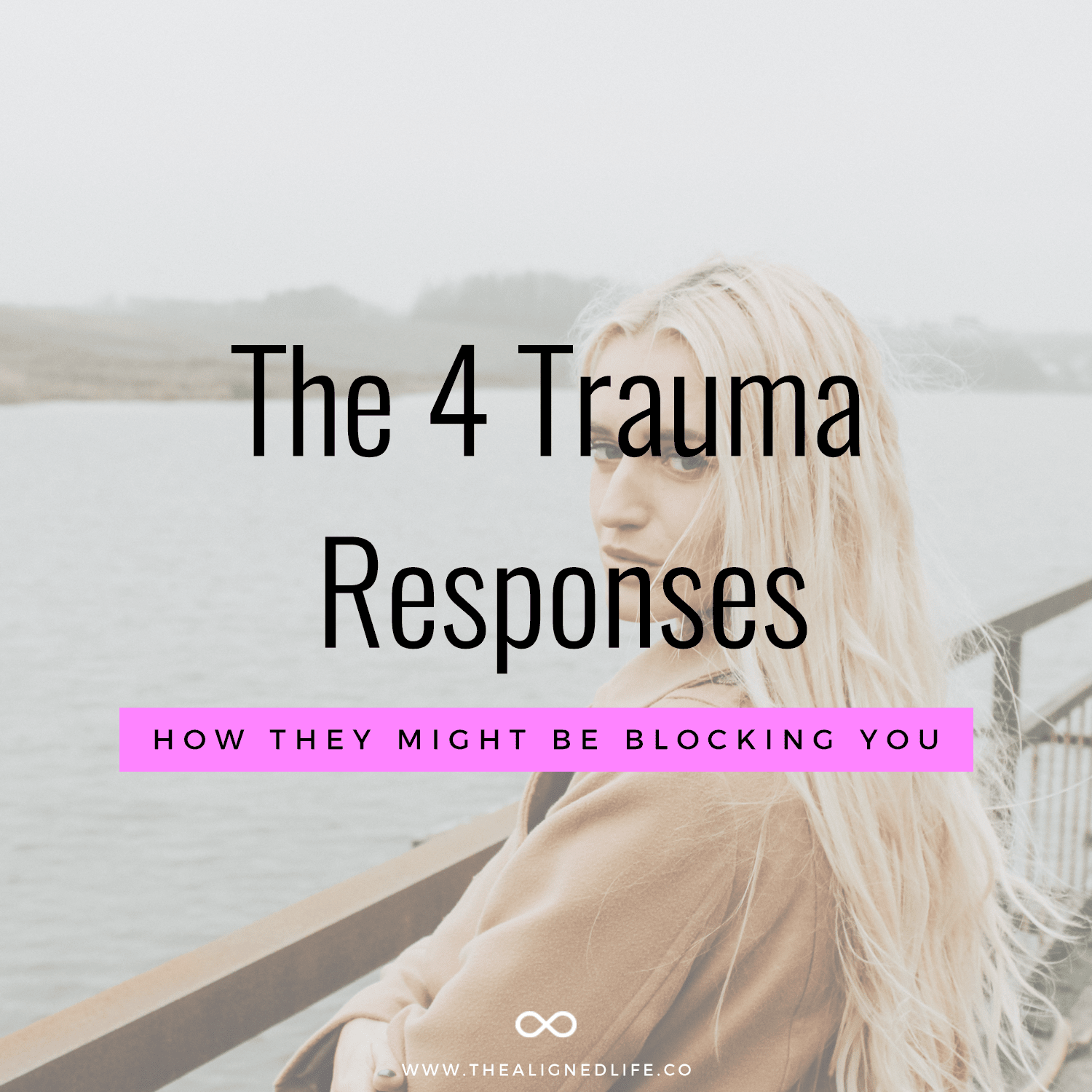The 4 Trauma Responses & How They Might Be Blocking You
Are your trauma responses blocking your manifestations? They might be.
Inside Heal’d, my virtual healing studio, I teach that trauma has a lot to do with your ability to manifest.
Essentially, the “lessons” your brain learned from your trauma at a young age turn into protection mechanisms.
And those protection mechanisms become some of your biggest manifestation blocks.
My definition of what I call Small-T Trauma (to differentiate it from Complex PTSD) is anytime your needs were not met as a child. Not every time this happened turned into a trauma but some of those moments definitely did.
For example:
A parent didn’t make it to your big recital or game. You internalized that as “My accomplishments don’t matter” or “I can’t trust people to show up for me.”
Now that you’re an adult, you’re very much beyond that moment in time! But your brain might still be reacting to certain situations with that old protection mechanism response.
You might be downplaying your accomplishments at work (and therefore not advancing your career as you want to.
Or you might have developed hyper independence, which in turn is affecting your ability to be vulnerable and authentic in your romantic relationships.
When I talk about this kind of Small-T Trauma many people are reluctant to see the patterns in their own lives. We don’t want to label anything that happened to us as traumatic because we love our parents and had a good childhood.
After all, we’re all imperfect people being raised by imperfect people. Even as fully grown adults who can communicate our needs and desires, we still experience conflict from time to time with those that we love. When we were children, we didn’t have the ability to even express those needs and desires. And since our parents are perfect at reading our minds (and of course they have their own stresses in life) how are they possibly going to met every need perfectly?
One aspect of trauma that I’ve been discovering more about recently are our programmed trauma responses.
Because even with the knowledge about what Small T-Trauma is, it can be difficult to notice where our trauma wounds are. And of course, if we don’t know where they are, we’re not going to be able to heal them.
Sometimes it’s helpful to notice our trauma responses first so we can work our way backwards from there.
There are four main trauma responses to be aware of.
The 4 Trauma Response & How They Might Be Blocking You
Trauma Response #1:
The Fight Response
When something threatens your sense of security, a very basic reaction is wanting to fight back. You simply feel attacked and want to attack back in order to stand your ground.
But since most of us aren’t out there actually physically throwing punches, this reaction typically displays itself in a few different ways.
Perhaps you have an avoidant attachment style in your romantic relationships. After a period of intense closeness with your partner, you suddenly find yourself picking a fight with them.
However, that fight isn’t really about the minor incident you’re choosing to get angry about! It’s that the intimacy that you’re experiencing is making your subconscious mind feel unsafe. (Because love can seem dangerous to many people.)
So subconsciously you chose to create a fight in order to create more distance–and therefore, so you can feel safe again.
Some questions to ask yourself:
- What’s the core fear I’m having in this moment?
- Does my response match the current situation?
- If you feel compelled to have the last word or get someone back, what feeling are you trying to recapture?
- If I had to express myself instead of fighting back, what would I say?
Trauma Response #2:
The Flight Response
The flight response occurs when something unpleasant happens and we immediately want to run away. Fortunately, this response is a little easier to recognize than the fight response.
A triggered flight response could mean constantly switching jobs whenever you come into conflict with one of your superiors. It could mean constantly changing majors in university. Or it could mean physically moving every year or constantly ending and starting new relationships, romantic or otherwise.
Some questions to ask yourself:
- Is there a way to get my needs/desires met that doesn’t involve running away?
- If I had to speak up or take an action, what would that be?
- Would someone else benefit by me voicing my needs/desires right now?
- If you feel like you’re facing the same problems in life over and over again, what could be a new way to handle yourself when you feel threatened?
Trauma Response #3:
The Freeze Response
The freeze response occurs when you feel so threatened that you can’t do anything at all. Instead of running or fighting, you simply seize up.
I’ve seen this happen many times with financial trauma. If you’ve ever received a bill in the mail and refused to even open it, that’s a perfect example of the freeze trauma response. Rest assured, this isn’t just you being irresponsible or stupid! It’s your brains clever way of “protecting” you that of course isn’t really protection at all.
The freeze response could also be not being able to speak up at work or during a heated discussion.
Or it could also look like just soldiering on through an unpleasant or even dangerous situation, because something about simply acknowledging this reality would make you feel even worse. (PS I have been there too!)
Some questions to ask yourself:
- Is there a circumstance I’m ignoring or downplaying in order to feel safe?
- What’s an action I could take that would better this situation?
- If I had to express myself fully right now, what would I say and to who?
Trauma Response #4:
The Fawn Response
The fawn response occurs when something “bad” happens to us and instead of fighting, running away or freezing, we choose to compliment or somehow help our attacker.
This trauma response basically looks like chronic people-pleasing. That could mean overextending yourself in a professional relationship, friendship, or even romance.
An example of this could be you choosing to go above and beyond for your more popular friends in high school.
Or maybe you’re secretly afraid that your partner is going to break up with you and you respond by cooking elaborate meals every night and doing only the things your partner is interested in. (Basically anything under the umbrella of the anxious attachment style.)
Some questions to ask yourself:
- What’s my core need right now?
- Is my people pleasing a good use of my time and resources? Is it appropriate to this relationship or scenario?
- Am I sacrificing my own needs or betraying myself through my actions?
- Am I secretly trying to control others through my “niceness”?
- If I had to express myself fully right now (without fawning) what would I say?
Please note: not all trauma responses are “bad”. Sometimes they do protect you in the way that they were intended to! However, if you’re having a chronic response to a certain situation in your life–especially in an area where you’re feeling a manifestation block–some inner healing work is probably in your best interests.
It’s also important to note that trauma wounds are not something you have to endure forever. They’re not punishment and they do not mean that you’re broken. I don’t want to talk about trauma to condemn you to a life of suffering! But going through this process with a curious heart can illuminate some core areas where we need some shadow work or inner child healing. After you can create that sense of wholeness inside of you, that’s when you can truly change your magnetism to the things that you want.
I hope this has enlightened you to think differently about your trauma. Please remember that you are ultimately stronger than these patterns and with a little love and attention, you can get past them. For more about that, come check out Heal’d, virtual healing studio.

Love This Post? Then Save It To Your Personal Growth Board On Pinterest!

- Seeing 222 Everywhere? The Meaning of Angel Number 222 - April 16, 2024
- 10+ Spiritual Shows To Watch On Netflix - April 9, 2024
- Sacral Authority Type | Human Design Explained - April 8, 2024

